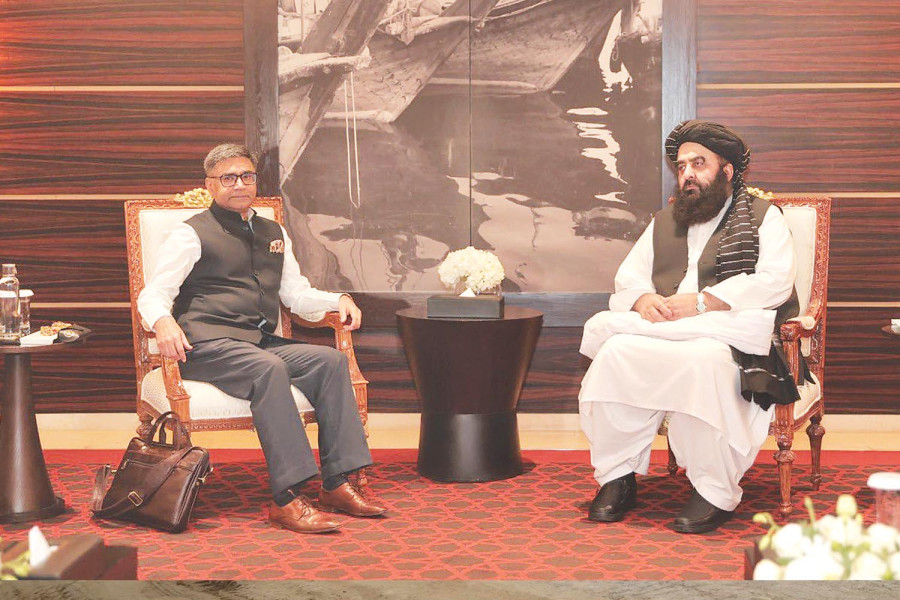Columns
India’s Taliban outreach
Improving relations with the Taliban will help India secure its economic, security and strategic interests.
Smruti S Pattanaik
On January 8, India’s Foreign Secretary Vikram Mishri met Afghanistan’s acting Foreign Minister Amir Khan Muttaqi in Dubai, signalling the expansion of India’s bilateral ties with Afghanistan. This meeting wasn’t a surprise as there have been several engagements with the Taliban after India initially shed its reservation on the group and, unlike in the past, was pragmatic about its relations. It was held following India’s condemnation of Pakistan’s air strike in Paktika, Afghanistan, that killed 46 Afghans. Pakistan launched its first cross-border airstrike in March last year in retaliation for the killing of seven soldiers in a suicide attack by the Tehreek e Taliban Pakistan (TTP).
Meanwhile, Pakistan-Taliban relations have deteriorated after the former carried out a cross-border incursion to target the TTP. Pakistan, which has sought strategic depth in Afghanistan and was instrumental in the Taliban’s resurgence in Kabul, has accused the Taliban regime of providing a haven for the TTP. The TTP has been the Taliban’s ideological ally, and its foot soldiers have helped the group in capturing power in Kabul. Earlier, in retaliation to the Taliban’s policy of sheltering the TTP, Pakistan had expelled 1.7 million undocumented Afghan refugees, creating a humanitarian crisis.
The Taliban has always denied the TTP’s existence on its soil, but such statements have been mere rhetoric. Although the Taliban has stated it will respond to these cross-border attacks on the TTP by Pakistan with appropriate security measures, the TTP attacks have been escalating, with casualties surpassing previous figures. This time, the Taliban were keen to engage with India, given the problems they were having with Islamabad, especially the cross-border attacks.
Engaging the Taliban 2.0
New Delhi’s relations with Kabul have been cautious, and its vital security interests are at stake in Afghanistan. In the past, the Taliban has made Afghanistan a favourable space for terrorists operating against India. The nightmare of the Indian Airlines Flight 814 hijack still haunts Indian policymakers. Moreover, India had refused to recognise and engage with the Taliban as they were considered proxies of Pakistan.
Unlike in the past, the Taliban 2.0 has promised to be different and keen to engage with New Delhi. After taking over Kabul in August 2021, the former Taliban spokesman Suhail Shaheen asked India to complete the India-funded development project in Afghanistan while saying that it would not allow its territory to be used against India. They do not want to sublet their foreign policy to Pakistan this time. Before the Taliban takeover, Deepak Mittal, Indian Ambassador in Qatar, met the Taliban leader Sher Mohammed Abbas Stanekzai in Doha at the Taliban’s request.
India has been providing humanitarian aid to Afghanistan since the collapse of Ashraf Ghani’s regime. In 2021, the Taliban took India’s supply of humanitarian aid consisting of 50,000 metric tons of wheat through the Karachi port with Pakistan and requested Islamabad to allow its passage through its territory. Afghanistan also received 250 tons of medical aid, 28 tons of earthquake relief aid and 11,000 units of hygiene kits, baby food, blankets and clothing.
After the fall of Kabul in August 2021, India withdrew its officials from the embassy as the security deteriorated. It reopened its embassy only in June the next year, with a few technical staff in Kabul to oversee the humanitarian assistance it was administering. By that time, India closely watched the Taliban’s relations with Pakistan as the then Inter-Services Intelligence (ISI) Chief Faiz Hamid appeared at the Serena Hotel in Afghanistan, sipping tea and elucidating a confident victory of Pakistan with the Taliban ensconced in power in Kabul.
Letting the old regime pass
Like other countries, India has not recognised the Taliban regime. Soon after Ghani’s exit, the Afghan Embassy in Delhi continued to function with the diplomatic staff appointed by his regime. As India reconciled to the Taliban takeover in Kabul, it had to deal with the question of the Afghan government’s representation in Delhi. In November 2023, the Afghan Embassy announced the closure of its diplomatic mission in Delhi, stating that it cannot work for an ‘illegitimate regime’ on its Twitter account and accused constant pressure from New Delhi to ‘relinquish control’.
Soon after this announcement, the Taliban government spokesperson said it is taking steps to reopen its embassy in India following the exit of Ghani-appointed diplomatic officials who have received asylum in third countries. In response to a question in the Rajya Sabha, the Indian government clarified in December that the Afghan Embassy in Delhi and its Consulates in Mumbai and Hyderabad continue to function.
When the Taliban took over power in Kabul for the first time in 1996, India had closed its embassy. However, this time, it was cautious and wanted to engage the Taliban without recognising them like other countries—an arrangement accepted by the Taliban. It hoped to continue with its projects and protect its vital security interests. In November, Indian officials met with the Taliban acting defence minister, Mohammad Yaqoob Mujahid, son of former Taliban Supremo Mullah Omar and its Foreign Minister, to evince India’s interest in engaging Afghanistan.
What next?
The Taliban government has also requested India to grant visas to its students and those seeking medical treatment in India. In August 2021, soon after the Taliban takeover, India cancelled visas for the Afghans as a precaution. The recent meeting pertains to the Iranian port of Chabahar, a vital link to India’s trade and connectivity to Afghanistan and Central Asia. In May last year, India inked a 10-year deal to manage the port, which the Taliban welcomed as an alternative to the Karachi port in Pakistan. Chabahar is also a crucial connection to the North-South transport corridor. The Taliban also sees this as an opportunity for landlocked countries like Afghanistan to have alternative routes for trade and to conduct business by investing in special economic zones. Moreover, India has mining interests in Afghanistan, especially the Hajigak mines. Improving relations with the Taliban will help it secure its economic, security and strategic interests, as well as assist Afghanistan in its regional outreach.




 9.6°C Kathmandu
9.6°C Kathmandu















